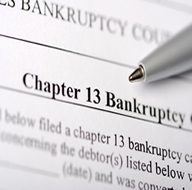| |
Testimonials |
 |
|
|
|
|
|
Chapter 13 |
 |
In Chapter 13, the debtor retains ownership and possession of all of his or her assets, but must devote some portion of his or her future income to repaying creditors, generally over a period of three to five years. The amount of payment and the period of the repayment plan depend upon a variety of factors, including the value of the debtor's property and the amount of a debtor's income and expenses. Secured creditors may be entitled to greater payment than unsecured creditors. Relief under Chapter 13 is available only to individuals with regular income whose debts do not exceed prescribed limits. If you are an individual or a sole proprietor, you are allowed to file for a Chapter 13 bankruptcy to repay all or part of your debts. Under this chapter, you can propose a repayment plan in which to pay your creditors over three to five years. |
If your monthly income is less than the state's median income, your plan will be for three years unless the court finds "just cause" to extend the plan for a longer period. If your monthly income is greater than your state's median income, the plan must generally be for five years. A plan cannot exceed the five-year limitation.
In contrast to Chapter 7, the debtor in Chapter 13 may keep all of his or her property, whether or not exempt. If the plan appears feasible and if the debtor complies with all the other requirements, the bankruptcy court will typically confirm the plan and the debtor and creditors will be bound by its terms. Creditors have no say in the formulation of the plan other than to object to the plan, if appropriate, on the grounds that it does not comply with one of the Code's statutory requirements. Generally, the payments are made to a trustee who in turn disburses the funds in accordance with the terms of the confirmed plan.
When the debtor completes payments pursuant to the terms of the plan, the court will formally grant the debtor a discharge of the debts provided for in the plan. However, if the debtor fails to make the agreed upon payments or fails to seek or gain court approval of a modified plan, a bankruptcy court will often dismiss the case on the motion of the trustee. Pursuant to the dismissal, creditors will typically resume pursuit of state law remedies to the extent a debt remains unpaid.
|
|

